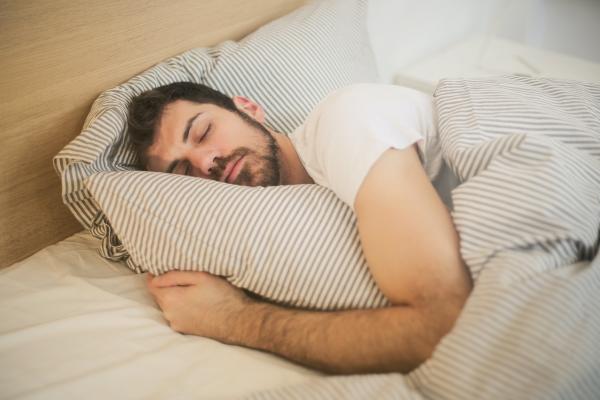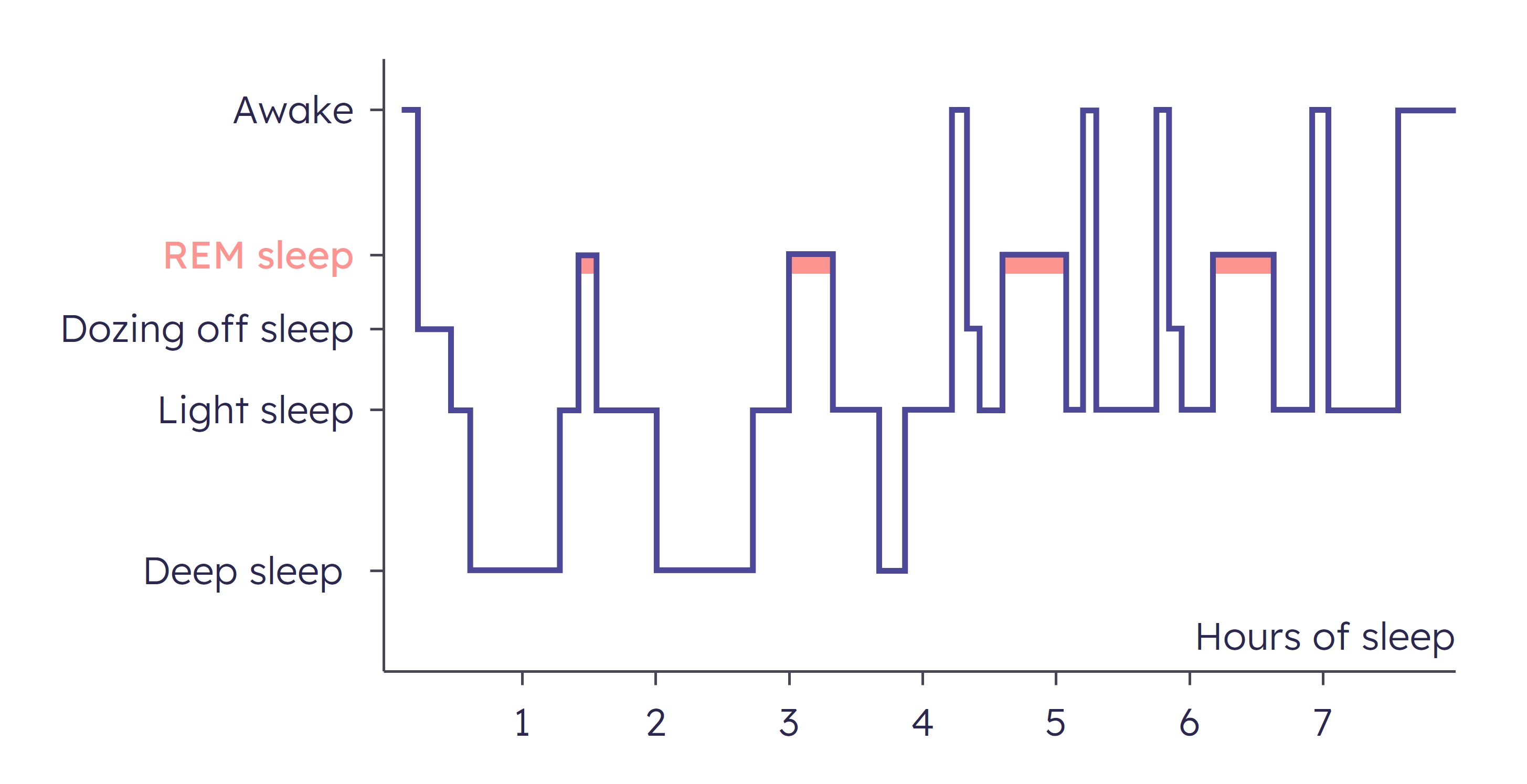Sleep and sleep problems
Sleeping is part of good health and is just as important as a balanced diet and sufficient exercise.
When I go to bed, I start thinking about everything and I lie there brooding. And when I finally sleep, the slightest noise wakes me up.

Did you know this?
The importance of a good night's sleep is often underestimated. It is a myth that everyone needs 8 hours' sleep. Short sleepers often get enough with 6 hours, while long sleepers sometimes need 9 to 10 hours of sleep. Approximately one third of people experience sleep problems. These are often temporary and the result of a particular event. For 15% of them, it becomes a chronic problem.
The importance of sleep
Sleep – together with a healthy diet and sufficient exercise – is essential for good health. By sleeping, you give your body the necessary rest to recover physically from your daytime activities. During sleep, your inner batteries are recharged so that your body can function normally again afterwards.
A good night's sleep also ensures better resistance and concentration. In addition, it contributes to your mental health: people who sleep well feel better in their own skin.
The need for sleep
On average, a person needs 7 to 8 hours of sleep. But the need for sleep is very personal and different for everyone. Your age also plays a role. As you get older, your sleep becomes more interrupted, lighter and shorter. Not only does it take longer to fall asleep, but your sleep also becomes shallower. Often, 6 to 6.5 hours of sleep is enough for older people.
The stages of sleep
Normal sleep has a fixed pattern and is made up of four to five sleep cycles of 90 to 120 minutes each during the night. Each of these sleep cycles is in turn subdivided into different stages:
- dozing off: This is the stage between being awake and going to sleep. You become tired, your eye movements slow down and you get the feeling that your eyes are closing. Eventually you give in, fall asleep and your brain activity decreases. This stage of light sleep usually only lasts a few minutes. If you wake up during this phase – which is very likely because you are still sleeping very lightly – you feel as if you have not slept at all.
- light sleep: Your muscles relax and your breathing becomes calmer. In this stage, it is more difficult to wake up, but you can still react to environmental sounds such as noise in the street, someone knocking on the door, etc. This stage covers 40–50% of normal sleep.
- deep sleep: This is the sleep your body needs to recover. Your body relaxes completely and your batteries are recharged for the next day. During your deep sleep, you don't wake up easily. If you do wake up, you may feel disoriented or sleep-deprived.
- dream or REM sleep: REM stands for Rapid Eye Movement and starts about 90 minutes after falling asleep. This stage is also called the dream stage because you can dream vividly during this stage. The dream stage is very important as it gives your brain the chance to process the events and information of the past day. Your breathing and heartbeat are irregular, your muscles relax, your eyes move quickly and your brain is very active. This is why you are immediately awake when you awaken from a dream sleep.
When sleep problems keep you up
You have a sleep problem if you have been sleeping badly for a long period of time and also experience discomfort during the day and function poorly as a result. For example, sleep problems can lead to fatigue, difficulty concentrating, irritability and mood swings.
Stress, noise, staying up too late, exercising or working before bedtime are common causes of disturbed sleep.
Sleep problems can take different forms. Different types of sleep problems are:
- Insomnia: the inability to get to sleep, problems sleeping well at night, or waking up early.
- Sleepwalking: you walk or move around to perform a variety of activities while asleep. Sleepwalking occurs during the deep sleep stage.
- Teeth grinding: involuntary, rhythmic gnawing or grinding movements.
- Nightmares: unpleasant dreams from which you are startled awake.
- Night terrors and screaming: feelings of anxiety leading to severe panic attacks and accompanied by screaming. This occurs during the first half of the night, during the deep sleep stage.
- Sleep apnoea: pauses in breathing or stopping breathing due to airway obstruction.
- Restless legs syndrome: irresistible urge to move your legs to ease uncomfortable sensations.
- Hypersomnia: increased daytime sleepiness or an increased need for sleep.
If you suffer from long-term insomnia, it is advisable to consult a doctor, who can investigate any medical causes. Problems with your thyroid gland, respiration, heartbeat or sugar regulation can be at the basis of insomnia.
Sleep medication can be a temporary aid to get through a difficult period. However, it is never a permanent solution. There are also serious risks associated with long-term use. Therefore, certainly do not take any medication without the advice of a doctor.
Test yourself
You can discover your sleep profile by answering questions on the sites Mini-sleep test and Sleep test (both in Dutch). These will give you advice tailored to your sleep profile. A sleep diary can give you insight into your sleeping pattern, your sleeping habits and the cause of disturbed sleep.
Sleep advice
- Maintain a healthy lifestyle, eat a balanced diet and get enough exercise.
- Fresh air contributes to healthy sleep. Go outside enough during the day.
- Estimate your own sleep needs and sleep as many hours as you need to be fit for the next day.
- A bed is for sleeping. Reading, watching TV and studying are best done elsewhere.
- Go to bed and get up at about the same time every day.
- Avoid sleeping during the day. If you are really tired, take a nap of no more than 30 minutes.
- Limit your nicotine and caffeine intake before bed. These substances make it harder to fall asleep.
- Avoid screens (smartphone, laptop, tablet, etc.) in the hour before you go to sleep. Their blue light keeps you awake.
- Do not drink alcohol before you go to sleep. Alcohol may help you fall asleep, but it will give you a restless night and make you tired the next day.
- Avoid heavy meals for the 2 hours before you go to bed. Are you still hungry in the evening? Then eat a light snack. Hunger can also disturb your sleep.
- Ensure a good sleeping environment: a sufficiently ventilated room, a good pillow, a dark and not too warm room, etc.
- Establish a sleep routine. Sometimes it's the little things that let you know you're going to sleep: take a bath with lavender oil, set the table for breakfast, brush your teeth, read for another fifteen minutes, etc.
- Sleep cannot be forced: it comes naturally. Relaxation techniques, however, can help you get to sleep.
Keen to learn, read or hear more about this topic?
Podcasts
Ted Talks
Websites
-
At Sleep well you can find numerous tips about good sleep habits. You will also find a Sleep well Do-book, a Sleep diary, sleep tests and a knowledge test about 10 sleep myths. (Dutch)
Powerful stories
You are not alone. Get inspired by other students' stories about vulnerability and doubt. But above all about the power of connectedness.
Go to the stories